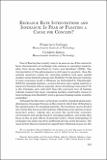Artículo
Exchange rate interventions and insurance: is fear of floating a cause for concern?
Fecha
2006Resumen
Fear of floating has recently come to be seen as one of the central de facto characteristics of exchange rate regimes in emerging markets, after first being identified by Calvo and Reinhart (2002). The interpretation of this phenomenon is still open to question. Does the optimal monetary regime for emerging markets with open capital markets entail limited exchange rate flexibility? Is the famous trilemma of open economies really a dilemma (as formulated by Shambaugh, 2004) for emerging markets—a choice between open capital markets or monetary freedom with no separate choice of exchange rate policy? Or is the trilemma alive and well? Does the pervasive fear of floating indicate instead that many emerging markets inadvisably choose to limit exchange rate flexibility when a genuine floating regime would be preferable?
Colecciones
Descargar


